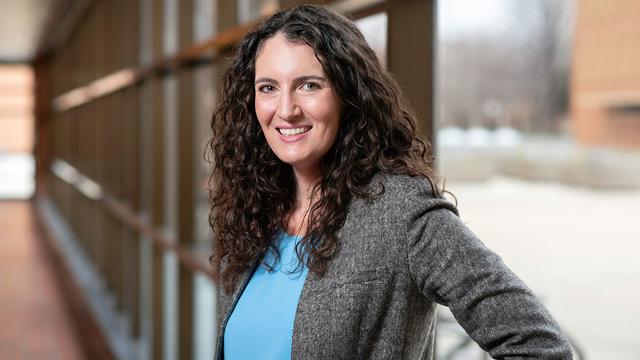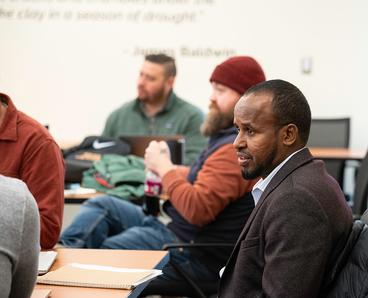By Ann Nordby
People often ask Dr. Hannah Lichtsinn why, after years of practicing medicine, she would choose to go back to school for a master's degree.
"I want to be in a position where I can lead change in a way that really helps all Minnesotans in the next decades. The Humphrey School Master of Public Affairs (MPA) program will help me do that."
Lichtsinn is a physician at Hennepin Healthcare in Minneapolis, specializing in pediatrics and internal medicine. She has a leadership role as medical director of the system's downtown clinic, and is increasingly involved in setting policy in local health care organizations. She is assembling an adult sickle cell disease treatment program.
Lichtsinn is also an active volunteer, co-leading an advocacy project to eliminate the use of solitary confinement for vulnerable incarcerated people in Minnesota, including youth, people with mental illness, and those who have experienced torture. She also has a young family.
"At work, I've become the policy person in the room, and in policy settings, I'm often the doctor in the room. I found myself wanting a deeper and broader knowledge," she said. "I already knew more than anyone else in the room but that wasn't enough for me."
Lichtsinn decided that leading change on big societal issues such as these required more than she could get from self study. Her decision to pursue an MPA at the Humphrey School was "logical," she said, for several reasons.
A lifelong Minnesotan, she knew the Humphrey School's reputation for offering a top-notch policy education. Now in her first year of the program, she has experienced it herself. "The breadth and depth of our professors is bar none," she said. "I feel lucky."
She also learned that the flexible program design of the MPA program, for mid-career students, worked with her busy schedule. The cohort model is ideal for professionals who are working full time. Lichtsinn and her classmates work together closely, and learn from each other.
Because all MPA students are mid-career professionals, one thing they have in common is busy lives – which infuses a sense of purpose and focus. "People in my cohort also have jobs and kids just like me. We can quickly relate to each other," Lichtsinn said.
The class includes professionals from widely varied backgrounds, and learning from them is a benefit of the program she hadn't expected.
"I could pick up a book and read about policy analysis, but the difference with this cohort is I'm learning how other people think, and to me that's incredibly valuable," she said.
MPA students learn to have focused, sometimes difficult, conversations about issues. During these discussions, students learn to hear and understand the perspectives of other people, but also their own. "We learn about identity and how our experiences shape leadership, and how we need to understand ourselves to lead effectively."
"In my cohort there are social workers, teachers, environmental advocates, people in health care, insurance, pharmacy, and government. There's very little overlap in how we will apply this knowledge," Lichtsinn said. "The knowledge and skills that I'll take away from it are so broadly applicable. For people who are interested in policy and leadership and want to create change, it doesn't matter what you've already done or in what field, the tools and skills we are learning are relevant."



